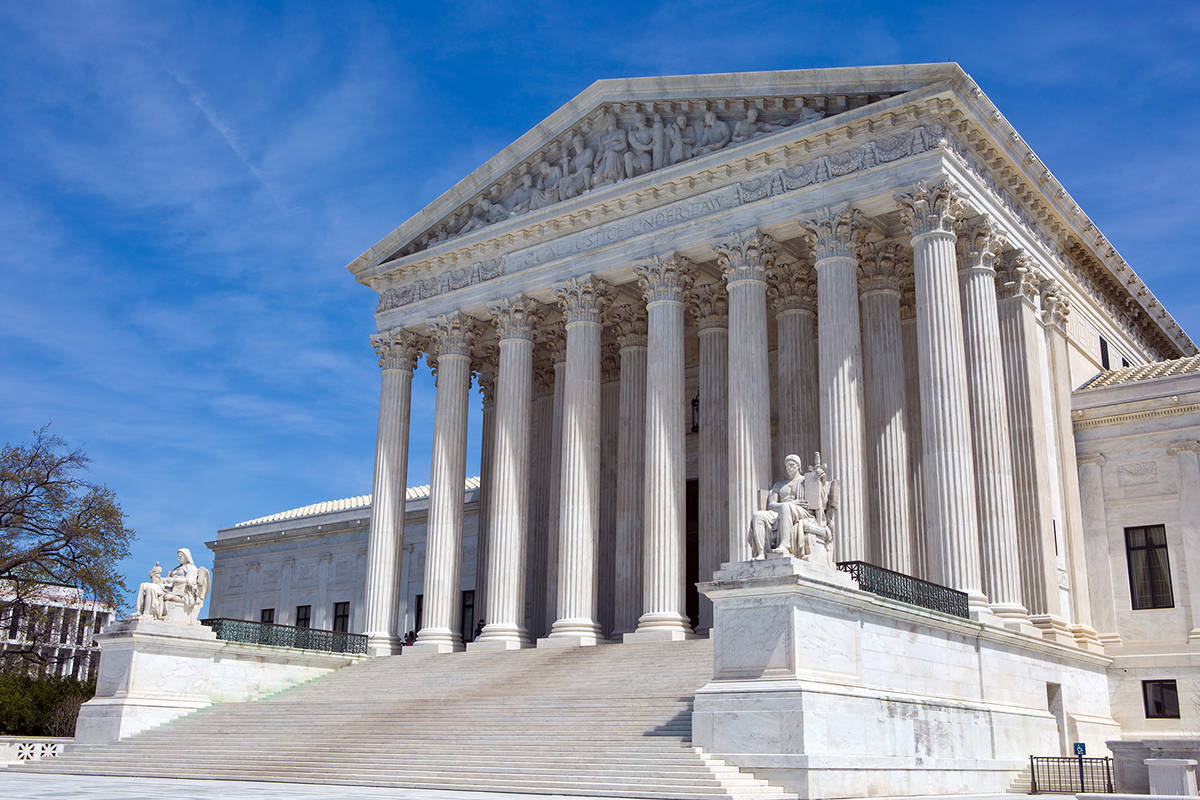Nevada’s equality advocates hail Supreme Court ruling
Silver State Equality wasted little time Monday celebrating the U.S. Supreme Court decision which ruled LGBTQ employees are protected from workplace discrimination under Title VII of the Civil Rights Act of 1964.
“We celebrate and applaud the Supreme Court’s decision to affirm that members of the LGBTQ+ community in every state across the nation are protected from discrimination in the workplace under federal law,” said Andre Wade, state director of Silver State Equality. “No one in this country should lose their job and their livelihood simply because of who they are. This may be one of the most consequential cases for our community since the Obergefell marriage equality decision.
The majority opinion was written by Justice Neil Gorsuch, who was appointed to the court by President Trump. Joining Gorsuch in the 6-3 ruling were Chief Justice John Roberts and Justices Ruth Bader Ginsburg, Stephen Breyer, Sonia Sotomayor and Elena Kagan.
“An employer who fires an individual for being homosexual or transgender fires that person for traits or actions it would not have questioned in members of a different sex,” Gorsuch wrote for the court. “Sex plays a necessary and undisguisable role in the decision, exactly what Title VII forbids.”
“Despite this important victory in our ongoing fight for equality, we must remain vigilant,” Wade said. “Our work is not over. We must pass the Equality Act, which has been sitting on Mitch McConnell’s desk for over a year, to ensure LGBTQ+ people are protected from discrimination in every aspect of life. And we must continue to stand strong in the fight for racial justice and our fight to ensure every American has access to quality, affordable health care.
“Today, we celebrate this important milestone. Tomorrow, the work continues.”
While Title VII bars discrimination on the basis of “race, color, national origin, sex, and religion,” the original bill didn’t define “sex” as a term. The Trump administration used that ambiguity to argue that lawmakers’ original intent focused solely on protecting women’s rights and, therefore, shouldn’t be extended to include sexual orientation or gender identity.
“The issue is not whether Congress can or should prohibit employment discrimination because of sexual orientation,” Solicitor General Noel J. Francisco, who represented the Trump administration, argued. “The issue, rather, is whether it did so when it prohibited discrimination because of sex.”
The LGBTQ community is made of up of approximately one million workers who identify as transgender and 7.1 million lesbian, gay and bisexual workers, according to UCLA’s Williams Institute. Twenty-two states, plus the District of Columbia have statutes protecting workers based on sexual orientation, according to the Williams Institute, while 21 states plus D.C. have statutes protecting workers from discrimination based on gender identity.
Justice Samuel Alito, one of the court’s conservatives, wrote in his dissent that “even if discrimination based on sexual orientation or gender identity could be squeezed into some arcane understanding of sex discrimination, the context in which Title VII was enacted would tell us that this is not what the statute’s terms were understood to mean at that time.”
Gay rights groups have conceded that sexual orientation was not on the minds of anyone in Congress when the civil rights law was passed. But they said when an employer fires a male employee for dating men, but not a female employee who dates men, that violates the law.
The Supreme Court majority accepted that idea.
“We agree that homosexuality and transgender status are distinct concepts from sex,” Gorsuch wrote. “But, as we’ve seen, discrimination based on homosexuality or transgender status necessarily entails discrimination based on sex; the first cannot happen without the second.”
Meanwhile, Justice Brett Kavanaugh, another conservative on the bench, acknowledged the social and political progress achieved by members of the LGBTQ community, but nonetheless dissented.
“They have advanced powerful policy arguments and can take pride in today’s result. Under the Constitution’s separation of powers, however, I believe that it was Congress’ role, not this Court’s, to amend Title VII. I therefore must respectfully dissent from the Court’s judgment,” Kavanaugh wrote.
Near the end of arguments in October, Justice Sonia Sotomayor, a member of the court’s liberal bloc, appeared to argue that Title VII should indeed be used to protect groups that historically have faced discrimination.
“We can’t deny that homosexuals are being fired merely for being who they are and not because of religious reasons, not because they are performing their jobs poorly, not because they can’t do whatever is required of a position,” she said, “but merely because they’re a suspect class to some people.”
The Supreme Court reached the decision after considering a trio of cases all filed in 2018.
In Altitude Express Inc. v. Zarda, a Long Island skydiving instructor named Don Zarda was fired after telling a client he was gay. While the U.S. Court of Appeals for the 2nd Circuit ruled Zarda’s firing was discriminatory, the 11th Circuit ruled the opposite way in a similar case, Bostock v. Clayton County, Georgia, in which plaintiff Gerald Bostock said he was fired after joining a gay recreational softball team.
“Today, we can go to work without the fear of being fired for who we are and who we love,” Bostock said in a statement. “Yet, there is more work to be done. Discrimination has no place in this world, and I will not rest until we have equal rights for all.”
And in a third lawsuit, R.G. &G.R. Harris Funeral Homes Inc. v. Equal Employment Opportunity Commission, a transgender woman named Aimee Stephens was fired from her job of six years after she announced plans to transition. Neither Zarda nor Stephens lived to see Monday’s ruling.














